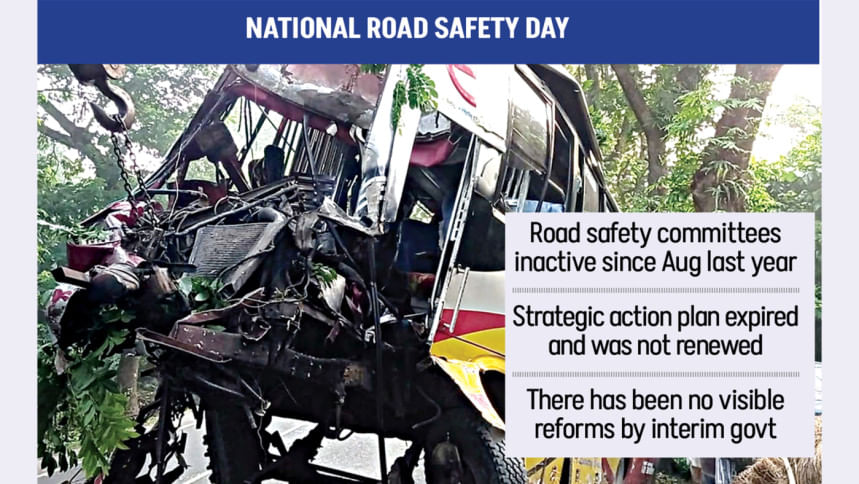Roads deadly, committees silent

Until the change of government following last year's mass uprising, at least four key committees or task forces had been entrusted with overseeing road safety -- a critical issue long neglected, costing hundreds of lives annually.They met occasionally -- mostly after major road crashes or when protests erupted over road safety issues. In those rushed meetings, they would arrive at nearly identical conclusions about reforming the road sector. But for years, little ever changed.As a result, road c...
Until the change of government following last year's mass uprising, at least four key committees or task forces had been entrusted with overseeing road safety -- a critical issue long neglected, costing hundreds of lives annually.
They met occasionally -- mostly after major road crashes or when protests erupted over road safety issues. In those rushed meetings, they would arrive at nearly identical conclusions about reforming the road sector. But for years, little ever changed.
As a result, road crashes kept rising, claiming thousands of lives and leaving many more with life-altering injuries.
Since the change of government, none of these committees has held a single meeting. They have not even been reconstituted.
There had been a "National Road Safety Strategic Action Plan" for reducing road crashes, which, though never effectively implemented, expired last December, and it was not renewed in the last 10 months.
The only visible step this government has taken regarding road safety was limiting the economic lifespan of the commercial vehicles. But the drive lost momentum allegedly due to pressure from transport owners and workers -- the same old story from the last regime.
As a result, the roads remain deadly.
Citing media reports, Bangladesh Jatri Kalyan Samity said 1,16,726 people were killed and 1,65,021 others injured in 67,890 road crashes between January 2014 and September 2025. Of them, 5,323 people were killed in 5,171 road crashes this year till September, it said
Mozammel Hoque Chowdhury, secretary general of Jatri Kalyan Samity told a press conference yesterday that severe shortcomings in strategic transport planning and the failure to address indiscipline led to a sharp rise in road crashes and fatalities under the previous government.
He added that despite a change in the government following last year's July uprising, the policies and strategies of the Ministry of Road Transport and Bridges, Bangladesh Road Transport Authority, and Traffic Police Division have remained largely unchanged.
"As a result, there has been no visible progress in curbing road crashes, reducing traffic congestion, or restoring order on the roads."
Against the backdrop, the National Road Safety Day is being observed today in its ninth annual iteration, with the theme "Standard Helmets, Safe Speed to Reduce Loss of Life and Property".
The National Road Safety Council (NRSC) was formed in 1995. Road minister is its chairman, while several other ministers, including those of home and railways, top government and police officials and transport leaders are its members.
The council, a top policymaking body on road safety, is supposed to sit every six months or as called by the chairman.
After the change in government, the committee was supposed to be restructured, especially since many members from the transport association had already been replaced. However, that revision was not carried out, a senior BRTA official said.
In February 2014, the government formed the Cabinet Committee on Road Safety with the then road minister as the convener of the seven-minister body.
The committee was supposed to take steps to remove markets and commercial establishments along national and regional highways and keep illegal three-wheelers known as "Nasimon" and "Karimon" off the roads, reads the Cabinet Division circular from February 13, 2014.
A high-powered task force led by the then home minister formed in October 2019 to execute 111 recommendations made by a government-commissioned committee to reduce crashes and bring discipline on roads.
The task force held several meetings during the previous government. But it too became non-operational after the political changeover.
The Bangladesh Road Transport Authority (BRTA) Act-2017 specifies the formation of an advisory council under the leadership of the road minister. The law stipulates seven terms of action for the advisory council, four of which are directly related to ensuring road safety and bringing discipline to the road transport sector.
The council held its first and, so far, the last meeting in May 2024.
Since 1997, the government has been preparing strategic action plans for improving road safety.
The National Road Safety Council approved the National Road Safety Strategic Action Plan (2021-2024) in November 2022 to reduce road crash fatalities and injuries by 20 to 25 percent by the end of 2024.
The tenure of the action plan expired, but the authority neither assessed the plan's outcome nor took steps to update it, the BRTA official said, seeking anonymity.
Abu Momtaz Saad Uddin Ahmed, chairman of BRTA, denied allegations that the interim government has failed to take visible steps to improve road safety.
He said mobile court drives are being conducted to remove vehicles that have exceeded their economic lifespan and rejected allegations that the initiative had lost momentum due to pressure from transport associations.
"We are actively working, and you will see changes soon," he told this correspondent.
When asked about the inactive committees, he said efforts are underway to reconstitute them.